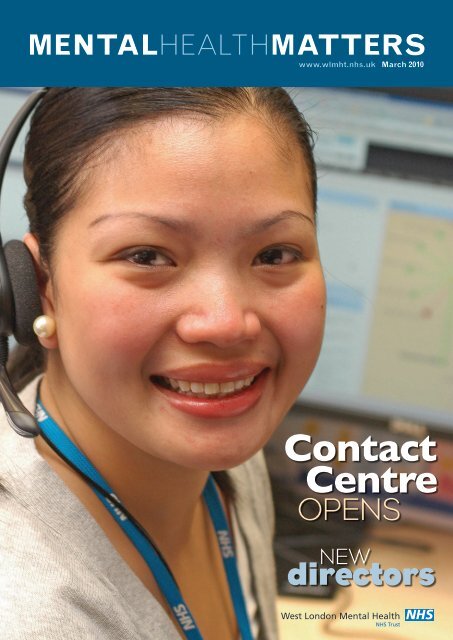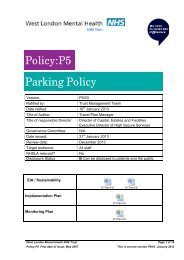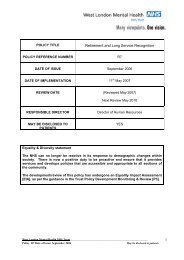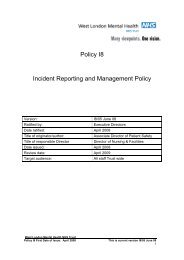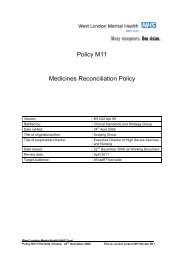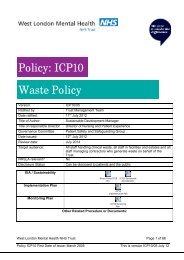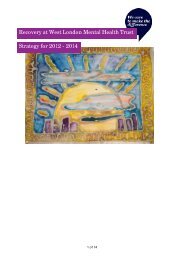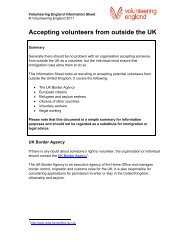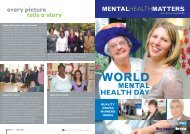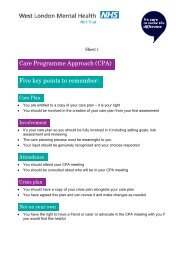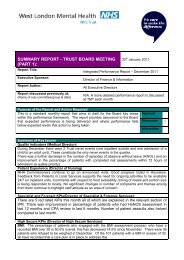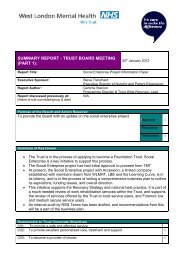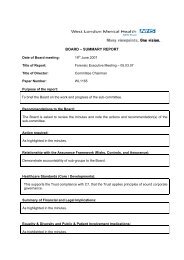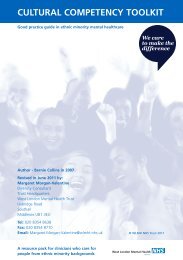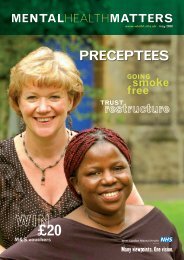MHM March 2010 - West London Mental Health NHS Trust
MHM March 2010 - West London Mental Health NHS Trust
MHM March 2010 - West London Mental Health NHS Trust
Create successful ePaper yourself
Turn your PDF publications into a flip-book with our unique Google optimized e-Paper software.
MENTALHEALTHMATTERSwww.wlmht.nhs.uk <strong>March</strong> <strong>2010</strong>ContactCentreopensNEWdirectorsMENTALHEALTHMATTERS 1
CUBBON’SCORNERIf you’ve not already done it Iwould like you to have a read ofthe Government’s ‘New Horizons:A Shared Vision for <strong>Mental</strong> <strong>Health</strong>’.This document was completedlast year and an updated versionwas published last month. It’s onthe Department of <strong>Health</strong> website(www.newhorizons.dh.gov.uk)The big change is that theGovernment now recognises mentalhealth and wellbeing, not just as ahealth concern, but as a major socialissue. We are told that no otherhealth condition matches mental illhealth in the combined extent ofprevalence, persistence and breadthof impact. It’s also recognised as anissue for our productivity as a nation,Editorial team<strong>Mental</strong> <strong>Health</strong> Matters is written for staff, at<strong>West</strong> <strong>London</strong> <strong>Mental</strong> <strong>Health</strong> <strong>NHS</strong> <strong>Trust</strong>, bythe Communications team. We’d love you tocontact us if you have any news or views forinclusion in the magazine.Email us at communications@wlmht.nhs.ukin terms of days of work lost andcost of care. This is the strategiccontext in which we are nowoperating – which is very different toeven just a few years ago.One thing that jumps out at mein the document is the plea from‘service users’ to be involved inhow their care is provided. Thisranges from simply being listenedto, through to structured serviceuser involvement in all levels ofdecision-making.You’ll read in <strong>MHM</strong> about our driveto ensure we effectively involvepeople using our services. Thiscovers everything from involvingpeople meaningfully in their CPAto having a service user or carer oninterview panels. It can also meantaking action when a service usercomplains about something toensure it doesn’t happen again, ormaking sure that feedback from thePatient Experience Trackers informsthe decisions we make in ourinpatient areas.For all the right reasons patientinvolvement needs to be a priorityfor us all. What’s also key is that theway <strong>NHS</strong> organisations are funded,and will be funded to a greaterextent in the future, is now linked tohow satisfied our patients are withthe care they receive. This means wereally must get it right and to do this,EditorTara Ferguson Jonestara.ferguson-jones@wlmht.nhs.ukTelephone: 020 8483 2283we need to be clear about what ourpatients want their experiences ofcare with us to be like.We’ve set up a trust wide PatientExperience Forum which willco-ordinate all user and carerinvolvement at the <strong>Trust</strong> to make sureit is meaningful and consistent and tomake sure feedback received informsour direction of travel at WLMHT.This group will co-ordinate all of ouraudit material, complaints data andfeedback from service users so wecan use it at board level. There willof course be service user and carerrepresentation on this forum.At the end of last year, we launchedour first service user Christmascard competition, which was a greatsuccess. It generated lots of interestand service users told us how muchthey enjoyed taking part. In the spiritof creating meaningful activities forour service users, I’ve asked thecommunications team to launchan art competition. The artworkswill be judged, by a group includinga service user, and the best piecesof art will be used to decoratewalls around the <strong>Trust</strong>. Look out formore information on the Exchangeand in flyers being sent out – andencourage the service users withwhom you work to take part.Peter Cubbon, Chief ExecutiveEditorial assistantAlison Nunanalison.nunan@wlmht.nhs.ukTelephone: 020 8354 8737trust newsBroadmoor redevelopmentThe re-development planning process forBroadmoor is still moving forward, underthe direction of Vickie Holcroft (pictured.)We were asked by the Departmentof <strong>Health</strong> to revisit our OutlineBusiness Case in light of the HighSecure Commissioners’ review of highsecure hospital services for the whole of the UK. Thisreview stipulated a smaller number of beds than we hadpreviously planned for, and this meant that we neededto adjust the scale of our plans and costs accordingly.These are now with the Department of <strong>Health</strong> and <strong>NHS</strong><strong>London</strong> for approval. If we’re successful at this stage, theTreasury is the next stop which we hope will be before<strong>Trust</strong> commended fordeveloping student nursesThe training we offer to student nurses on placement withus has been commended by the Nursing and MidwiferyCouncil (NMC). They recently undertook an assessmentof our ability to provide high quality nursing placements forstudents.Says Steve Trenchard, Director of Nursing and PatientExperience: “This is really good news for our studentnurses and I’d like specifically to thank the very manyunsung mentors around the <strong>Trust</strong> who consistently workhard to achieve a quality learning environment for ourstudents. There has been a phenomenal amount of energyput into the development of students by our nurses andfor this I am grateful. Well done!”At any one time we have around 300 student nurseson three year placements at the <strong>Trust</strong> from Bucks NewUniversity and Thames Valley University.The NMC visited Hounslow and Hammersmith & FulhamSDUs. Sandra Bailey, Head of Nursing in Hammersmith& Fulham said: “We had the privilege of a visit from theNMC last week. The reviewer who visited H&F met withstaff and students and was very pleased with the workbeing undertaken and the level of commitment to preregistrationlearning in partnership with the universities.We are very pleased with the outcome of the review andwould like to thank all those who were involved for theircontribution in making the visit a success.”the election. There is however a chance that we will notget full approval until the summer.In the meantime, we will begin the early design process.In addition Bracknell Forest Council are proceeding witha consultation process for their Local DevelopmentFramework (LDF) and have already announced this tothe local press. The Broadmoor re-development is partof this as it would provide some of the land they need toimprove local housing and amenities. This means they arevery supportive of our plans.We remain cautiously optimistic, bearing in mindthe CQC report and its recommendations for newinfrastructure to improve patient safety and recovery.More news when we have it.Medicines informationDid you know, information leaflets on 32 medicinesprescribed for adults with mental illness are filedon the Exchange for you to print off and give outwhen you need them? Go to homepage / clinicaltoolkit / managing medicines / information forpatients. These leaflets are available in a number ofdifferent languages, from Albanian to Urdu in thesame folder, and if you work with children you willsee there are leaflets specifically for them too.If you have access to the internet you might wantto have a look at www.choiceandmedication.org.uk, which is a high quality source of informationabout mental illnesses and their treatment, forpeople who use services, carers and professionals.As always the pharmacy team is available toprovide medicines information and for advice onclozapine, contact the clozapine clinic nurse in theSDU, who also has access to a DVD on clozapine,which has been put together for patients, carersand professionals.2 MENTALHEALTHMATTERS MENTALHEALTHMATTERS 3
BOARD TALKRuth Lewis is our new Director of Organisational Development (OD) and WorkforceRuth joined the <strong>Trust</strong> last month, from KingstonHospital where she has been Director of Workforce& OD for two years. Her previous <strong>NHS</strong> rolesinclude Director of Productivity through Peoplefor South <strong>West</strong> <strong>London</strong> SHA and the Director ofHR & OD for Mayday Hospital in Croydon.Following a degree in social administration andsocial policy, Ruth joined British Airways’ graduatetraining programme. Twenty one years in the airlinefollowed, largely in human resources, training andorganisation development roles. While at BA, Ruthgained a masters in organisation development whilstsponsored to study in the United States.Ruth joined the <strong>NHS</strong> from Jewish Care (JC), thelargest health and social care provider to the Jewishcommunity in South East England. The only non-Jewish director, Ruth applied her business acumen toaddressing rising operational deficits in the charity.Numerous services were provided by the charityincluding day centres, residential care and housingfor people suffering from mental health, learningdifficulties or disability.Prior to that, Ruth was the Recruitment Directorat VSO (Voluntary Service Overseas). There shestreamlined processes and initiated a majorculture change programme. The aim of this was toimprove relationships with the charity’s volunteers,enabling cheaper recruitment and better volunteerengagement after their placements in developingcountries.Why have you chosen to come and work here?I’ve been in the <strong>NHS</strong> since 2005, but have notworked directly in a mental health trust, so wasattracted by the prospect of working in a differentarea of the health service. JC sparked my interest inmental health and my mother had dementia untilher death earlier this year. Also, I live within strikingdistance of my new base, only 8.5 miles away! I wasaware of the <strong>Trust</strong>’s CQC report and felt that the rolewould present a worthwhile challenge as well as agreat opportunity to make a difference.This is the first time we’ve had an OD lead on theBoard. What exactly is OD?Organisational development is a holistic andsystematic approach to driving improvement inthe outputs an organisation wants. Based on thebehavioural sciences, it starts with research involvingpeople within the organisation. The researchresults in a diagnostic that is fed back to the earlierparticipants. This then leads to generating ideas forimprovement, prioritisation and documented actionplans. Very often these processes are facilitated byOD consultants - either internal or external. Thediagnostic looks at every aspect of ‘how we do thingsaround here’ – strategies, communication, policies,processes, procedures, systems, attitudes, values andbehaviours. There are always areas for improvement,but building on strengths is just as important asaddressing deficits.”Organisational developmentis a holistic and systematic approachto driving improvement in theoutputs an organisation wants.Based on the behavioural sciences,it starts with research involving”people within the organisation.What are your priorities?I’ve been getting out to meet colleagues and thereare many more to meet and listen to as part of myinduction and data gathering exercise. I’m alreadyhearing what we need to build on and where helpmight be needed to improve things. I’ve alreadybeen directed to the hot spots such as recruitment,PDRs (appraisals) and mandatory training, whichare fundamental to delivering high quality care andsatisfying our regulators - not to mention keepingour insurance premiums down so that we can spendmore on front line provision.I’ll be working with Peter Cubbon and the seniorteam to ensure we have clarity amongst theleadership about where we are going and the keyworkstreams needed to get there. We need tocommunicate our aspirations and discuss themwith colleagues so that everyone in the <strong>Trust</strong> feelsenthusiastic about their part and understands howeverything fits together. Another priority will beensuring alignment in workstreams so that wemaximise the outputs from our limited resources,especially as there will be increasing pressure on thepublic purse.To ensure that we all contribute effectively tothe <strong>Trust</strong>’s objectives we need to strengthenthe individual performance management anddevelopment processes. My team has already beenreviewing the PDR process to simplify it. Havingquality dialogue during the PDR process, to jointlyidentify how to do things better and determinewhat development would support improvement orprogression, is key to retaining talented people andincreasing overall capability and capacity.So, I’ll be looking closely at all our processes to seewhat might be done to improve things. Revisionsto policies or processes will be made with linemanagement and staffside involvement, as this willbe a collaborative effort to shape all our futures andto better support our patients. I invite any memberof staff to give me their thoughts on what helps andhinders us in our endeavour to give personalisedhigh quality care.Describe yourself in four words?Energetic, supportive, challenging, straight-talking.What are your hopes for the <strong>Trust</strong>?I hope that the overwhelming majority of WLMHTstaff, patients and carers will speak positively aboutthe <strong>Trust</strong> so that we readily attract talented colleaguesand increase our share of the commissioners’business – thus creating a virtuous circle. Throughappropriate development activities that help usto deliver our objectives, I hope we retain goodpeople and increase the overall capability of theorganisation. Part of building a supportive culturethat encourages development involves working toensure that poor performance is identified early”This approach makes for ahigh performing organisation whichevery one of us would be proud torecommend to our loved ones, family,friends and neighbours – either forfuture employment or care.”and addressed – relevant support will be providedto ensure we all continuously improve. However,none of us should have to carry poor performers andfinding alternative roles that better fit the skills ofthe individual, or helping them to move outside theorganisation will be necessary. This approach makesfor a high performing organisation which every oneof us would be proud to recommend to our lovedones, family, friends and neighbours – either forfuture employment or care.What three things would you put in your Room 101?• Tripe – boiled it for nearly 24 hours and it stillwasn’t edible• Hot pants – don’t suit most women, me included• The video-recorder – still don’t know how toprogramme it and never have time to watch TV letalone recorded items!What do you like doing when you’re not at work?Aerobics, walking, spending time with my husbandSteve, our families and friends.What’s the best piece of advice you have been given?Don’t stick in your comfort zone – you can do morethan you realise.4 MENTALHEALTHMATTERS MENTALHEALTHMATTERS 5
From the left is: Adrian <strong>March</strong>, Joe Kelly, Lorraine Bacon, John Viner, Michelle Monrose and Jackie Lesser.Patients are the expertsReport by Sue Cumming, PPI lead and Steve Trenchard, Director of Nursing and Patient ExperienceEnsuring the effective involvementof people using services (whethera patient or their carers/families/friend) isn’t about ticking a box ordoing something because it ‘looksgood’ or because it is a target. Itis soon to be a core requirementof all service delivery and all <strong>NHS</strong>and independent providers will beassessed on this area as part of thenew ‘Essential Standards of Qualityand Safety,’ from the Care QualityCommission (CQC).This new legislation says that wemust involve service users and theircarers and that this must be realtime,focusing on their experiencesand satisfaction as well as providingdemonstrable outcomes arisingfrom care with the service. Hereat WLMHT we believe thatinvolvement is about harnessingthe expert experience of peopleusing services and their family andfriends so that we can learn from thiscontact and improve services.Think of a time that you went toyour GP or a hospital department- as the person experiencing theservice first hand you will havebeen in the best position to givefeedback on how that service wasexperienced and importantly offerideas on how it could be improved.It may have been about theenvironment, the information youreceived before you were seen, orother improvements such as seatingarrangements, attitudes of staff ordirections on how to get there ontime. This is just the type of expertexperience feedback we are seekingService user monitoringA group of service users from theEaling User Involvement project,‘Loud and Clear’, have set up agroup, which meets once a week,to monitor the experiences ofinpatients in the John ConollyWing. They go onto the wards,in pairs and ask service users, tofill in questionnaires about theirexperiences on the ward. So far, theteam has produced three reportswhich provide general conclusionsand ward by ward analysis onstaff attitude, care and ward6 MENTALHEALTHMATTERSenvironment. During the courseof the year they will produce threemore reports and final conclusions.Mike Loosley, who manages theproject says: “The group has beentotally professional as if carryingout an audit. As a result of thisproject, we are already seeinga difference. There has been amarked improvement in raisingthe standards, as suggestions thathave come out of the surveyhave been put into an action planand implemented. For example,from those that use our services.The <strong>Trust</strong> has a strategy for bothservice user and carer involvement.We are now developing morerobust arrangements to make sureinformation is being shared from ourwards to the Board. This includesreporting the information fromPatient Experience Trackers (PET’s)to the Board, and working to makesure the patient experience is at theheart of all we do. Feedback fromPET’s will be going back to wardsand local actions should be agreedwithin ward communities to addressconcerns, as well as celebrate localsuccesses. We are also continuing toprovide training on service user andcarer involvement across the <strong>Trust</strong>sites and this is publicised throughTraining Matters.all patients now have ‘protectedtime’ slots with their nurse.Another change is that water isnow more readily available foranyone who needs it. This activityempowers both service userswho are asking the questions andthose who are responding.”IntroducingLeeanne McGeeExecutive Director of High SecureServices at Broadmoor HospitalWhy Broadmoor?Opportunities like this do not come along veryoften, so when I heard about the vacancy, I leaptat the chance to apply to come here and lead theteam to bring Broadmoor back to the fore of forensicpsychiatry. It’s a service I understand as I’ve workedin both high and medium secure services before.Where else have you worked?My last role was Borough Director of Adult <strong>Mental</strong>health Services in Tower Hamlets at East <strong>London</strong>Foundation <strong>Trust</strong>, where I had worked for just overthree years. I’ve worked in adult psychiatry andforensic services for over 20 years. I’ve also managedmedium secure services in Hackney and managedPD, DSPD and mental health services at Ramptonhospital where I worked for six years. By backgroundI am a registered mental health and general nurseand still miss the patient contact from my daysworking on the wards.First impressions?I’ve been very impressed by the committed staffI have met so far and I’ve been made to feel verywelcome. I get the impression that many staffYou told us - we’ve listenedStaff at Broadmoor told us insurveys that they wanted easieraccess to refreshment facilitiesin their working environment.So the <strong>Trust</strong> Board has approveda new staff restaurant atBroadmoor. Currently, staff haveto go ‘outside the walls’ of thehospital to eat or drink, whichcan be inconvenient. The newrestaurant will be within thesecure perimeter so staff canmake better use of their time offthe wards. Within the new facilityin the hospital welcome the change processalready underway at the <strong>Trust</strong>. Both patients andstaff have told me how very keen they are for theBroadmoor site to be redeveloped so that theenvironment is better for patients and care teams.It’s really important that the confidence of externalagencies like commissioners, carers and <strong>NHS</strong><strong>London</strong> is maintained so that we can progress theredevelopment of the site so everyone benefits.Immediate priorities?Seeing through the reconfiguration of services atBroadmoor Hospital and managing it safely forpatients and staff. Improving confidence in thehospital and its services.Your management style?I’m a great believer in being open and honest withpeople in all communications. I have an open doorpolicy, as I understand the importance of two-waydialogue. I want staff to come and see me if theyhave ideas or issues to discuss and I’ll be out andabout regularly, day and night, meeting the staff andtrying to put as many names to faces as possible.you will be able to access hot andcold food when the restaurantis closed. The existing restaurantwill be used for meeting roomsand enhanced L&D facilities.MENTALHEALTHMATTERS 7
Improving serviceuser experiencesAnnual nursing conferenceNurses from all areas of the <strong>Trust</strong>,and for the first time a number ofour service users, attended this year’snursing conference. Director ofNursing and Patient Experience, SteveTrenchard co-chaired the conferencewith Jules Tennick, a user of ourservices in Ealing.Jules says: “I think it was a positivemove forward for the <strong>Trust</strong> tohave a service user co-chairing theconference. It gave a positive imageof the abilities of service users, it wasgood for my own confidence and itwas a pleasure to be asked to do this.”Steve Trenchard adds: “The serviceuser experience is now recognisedas one of the three critical elementsof quality. This is one of the reasonsI was pleased that our conferencefocused on improving the serviceuser experience. It gave us a greatopportunity to hear from and learnfrom experts in the field (both staffand patients).“Key messages of the day werethe importance of feeling valuedand to celebrate what works well,and then celebrate it again! Alsoto remove wherever possible anyTime to care at the conferenceThe nursing conferencehighlighted how Timeto Care is improvingpatients’ experience.Carol Scott, DeputyDirector of Nursing,introduced the Time toCare concept by explaining its overall aim: to improvepatients’ experience and therapeutic relationships byincreasing the amount of time nurses have to dedicateto direct patient care. This is achieved through a range ofactivities that fall under the umbrella of Time to Care.Diane Wiles, Headof Nursing for EalingSDU, illustrated theentire Time to Careprogramme in action,highlighting the fantasticachievements made inEaling inpatient services. Joe Ayres from Broadmoorhospital demonstrated ways in which wards havedelivered meaningful therapeutic activities through theStar Wards programme.An Ealing service user gave a heart-warming speechand poetry recital, and emphasised the importance thistherapeutic activity played in his recovery.Sandra Bailey, Head of Nursing for H&F and BernieCollins from the Diversity Unit each discussed ActivityFollows and Respect and Responsibility workshopsrespectively, updating the audience on forthcomingplans and highlighting their importance in improvingpatient experience.The Time to Care project team is nowworking to develop a project implementationplan. If you want any information pleasecontact the project team on x 8464 or 2003.sense of ‘us and them’ in all of ourcommunication and interactions –with each other, with people usingour services and with their friendsand families. A powerful message forme from a number of workshopsand presentations was the need forall staff to have positive attitudes thatsupport optimism and create hopeinspiring relationships.”Tracey McErlain – Burns, Chief Nurseand Director of Patient Experiencefrom The Mid Yorkshire Hospitals<strong>NHS</strong> <strong>Trust</strong> spoke about identifying,measuring and improving patientcare. The <strong>Trust</strong> she works for hasbeen through similar challenges tothose we are facing here. She spokeabout her experiences of fulfilling‘ward to board’ responsibilitiesfor capturing and understandingpatient experience. She sharedher reflections on working in a<strong>Trust</strong> where change happened andstandards of care improved as aresult of a real focus on the patientexperience.Kath Lovell and Andy Brooker whowork for Emergence, an organisationwhich works to improve experiencesfor people with personality disorder,spoke about the evolving nature ofnursing patients with PD. They spokeabout the importance of consultingpatients and involving them to informservice delivery and improve it.There was also a presentation onTime to Care at <strong>West</strong> <strong>London</strong><strong>Mental</strong> <strong>Health</strong> <strong>Trust</strong> and howthis is improving the serviceuser experience. A number ofworkshops were held during theday. For example, there was onein which some of our forensicservice users shared their thoughtson recovery. In others staff sharedthe work they had done to usefeedback from service users toimprove care. There was also asession on working with serviceusers to recruit staff at the <strong>Trust</strong>.In summing up the day Steve said:“Nurses at the <strong>Trust</strong> gave a veryclear message on the day that thepatient experience is at the veryheart of everything we do. Theconversations throughout the daywere characterised by a sense ofhumility, compassion and honesty.The day gave us the opportunityto reflect on and explore thecomplexities of delivering andreceiving mental health care.”Comments from the day include:“It was good to have serviceusers with us today. It wouldbe good to include some carerstoo, the next time we have aconference.”“It was a fulfilling andinformative event.”“I think we should encouragemore front-line staff to attendthe next time.”“Thank-you to all the service userswho participated – well done!”“It was good day. I learnt a lotand will go away and share itwith others.”8 MENTALHEALTHMATTERSMENTALHEALTHMATTERS 9
New primary healthcare service for<strong>West</strong> <strong>London</strong> ForensicBroadmoor facilities team includes: Eileen Slater, Jill Sharman, Clay Ryan, Jacqui Trueman, Dawn Howcroft, Alan Lane, Belinda Huse, Katrina Elder and Claire Webb.The Changing Face ofEstates and FacilitiesReport from Barbara Wood, Director of Estates and FacilitiesOver the past year we have beenmaking significant changes in ourdepartment to enable us to offerthe highest levels of service possibleto patients and staff across the<strong>Trust</strong>. We still have lots more workto do, but this is a summary of thehighlights so far.Last year, at Broadmoor Hospital,we set up our Estates and FacilitiesModernisation Group. This groupwas established to bring together, staffside representatives, managementand clinical staff to jointly takeforward the modernisation of theE & F Department. As a result ofthis group we have made significantchanges to the maintenance anddomestic departments so thatwe are now providing high quality,responsive services to the wholehospital. The domestic departmentstructure is now based on teamsat ward level managed locally byFacilities Coordinators to ensurewe respond to the needs of thepatients and provide leadership to theteams to ensure there is a consistentfocus on performance. We will bedeveloping performance indicatorsto demonstrate our intention tocontinually improve standards.All of our Broadmoor domesticstaff will be undertaking a nationallyrecognised cleanliness qualificationover the next few months so thatstandards of cleanliness and infectioncontrol are brought in line with10 MENTALHEALTHMATTERSthe NPSA National Standards ofCleanliness.A great deal of change has also beenhappening at the <strong>London</strong> end ofthe <strong>Trust</strong> too. For example, in Ealingwe’ve introduced E & F BuildingCo-ordinators who are responsiblefor managing maintenance andminor new works. There are fourco-ordinators who each haveresponsibility for a particular areaand they are the first port of callif anything goes wrong. They workclosely with clinical staff to assess theirmaintenance needs and organisefor the appropriate works to becarried out. The value of this rolewas recently demonstrated by theco-ordination of over 1,000 piecesof work in six weeks within JohnConnoly Wing to improve the patientenvironment.In addition to the BuildingCoordinators, the Estates & FacilitiesTeam can now be identified bytheir distinctive blue jackets whichdifferentiate them from the othercontractors operating on the Ealingsite (modelled on the “Green Men”of Broadmoor).John Scully, Trade Supervisor, Terry Sandford andBertie Nota, Maintenance Coordinators.If you have suggestions forfurther improvements youwould like to see please contactBarbara.wood@wlmht.nhs.ukThe Housekeeper role was piloted inEaling last year and through audit weknow their role is making a difference.They are a first port of call for wardmanagers when something goeswrong on a ward and are responsiblefor making sure all estates and facilitiesissues are dealt with in their areaquickly.The Environmental <strong>Health</strong>Officers from the <strong>London</strong> Boroughof Ealing recently welcomed thepositive impact these postholdershave had on the wards.Domestic staff in all of the <strong>London</strong>SDUs have been trained to the newNational Standards of Cleanliness,they have better equipment thanbefore and we have enhanced thecleaning products they are using.We have also been working withan external agency to deep cleanall of our inpatient areas, and werecommended recently by the CQCfor the difference this is making to theexperiences of patients on our wards.We will also soon be introducing anew hand held auditing tool whichwill help audit levels of cleanliness onthe wards, to help us identify areaswhich are not being cleaned properlyso we can take action to put it right.These hand held audit tools will alsogather patient feedback on their wardenvironment helping us to deliver apatient focused service. Staff are alsotaking a real pride in their improvedenvironments and E & F services havenever been busier!In collaboration with Harmoni for <strong>Health</strong>,the <strong>West</strong> <strong>London</strong> Forensic Service hasestablished a new and comprehensiveprimary health care service which cameinto operation at the start of February. Itis based in the Tony Hillis wing at Ealing inwhat used to be Baron 2 ward.Every inpatient in the SDU now has quick and easyaccess to a full range of primary care services as theywould if they were living in the community.A patient in Tony Hillis wing said: “The clinic will make itmuch quicker for us to see a GP and it will save lots oftime on the wards, as we’re all escorted to appointments.Before we had to go to Ealing Hospital, so this newarrangement will make a real difference. The waiting areais also much better in the new clinic.”The clinic will be run by a GP and nurse team, with visitsfrom other health professionals including a chiropodist,optician, physiotherapist, dietitian and pharmacist. Clinicswill be held in three primary care suites situated ineach secure building on the Ealing site. The suites arethe Primary <strong>Health</strong>care Centre in the Tony Hillis Wing,Orchard Primary <strong>Health</strong>care Centre and the RainbowPrimary <strong>Health</strong> Centre (RSU). The service will alsoextend to the wards in the event of patients being too illto attend a clinic.Physical healthcare trainingStaff from Ealing and Hammersmith& Fulham SDUs recently attended‘The Psychological Aspects ofPhysical Illness’, a health psychologyin- service training programme tohelp them become more aware andknowledgeable about physical healthproblems amongst our service users.Dr Pooja Sharma, Chartered ClinicalPsychologist who organised thistraining programme says: “It has beena very useful learning experiencefor the staff who have been able toattend these sessions and helps us asprofessionals use this knowledge inour clinical practise.”Members of the primary care team, from the left: Gina Hillis, SeniorNurse Manager and GPs, Dr Naz Asghar and Dr James Whitticase.Gina Hillis, Senior Nurse Manager says: “I am reallyexcited to be working in this new service which islong overdue. Our patients need to have easy accessto primary care, as their physical health is oftencompromised due to the effects of the medicines theyare on, the repetitive nature of their diets and a lack ofexercise. We are providing this new service to patients,to help aid their recovery and improve the quality oftheir lives.”For more informationcall x2220 (020 8483 2220)From the left (front row) Dr Sarwat Nauroze, Dr Urmila Pillay, Prof John Weinman, Dr Pooja Sharma,Nuria Bara-Carril and Dr Yvonne McCulloch. (Middle) Dr Abel Koshy, Richard McLeod, Angela Manning, DrManisha Desai, Dr Kushangi Patel and Anupama Sekhar. ( Back) Tara-Jane Clark and Mishael Soremekun.MENTALHEALTHMATTERS11
local NEWSMakeoverCar valeting services, run by service users as part of workrehabilitation on the St Bernard’s site, have had their facilitiesupgraded. Christiana Joseph, Head of Work Rehabilitation says:“By increasing the capacity of the unit for our customers we are nowable to offer morning and afternoon sessions. The improvementsprovide a better working environment for team workers and staffand customers are impressed by the professionalism of the service.”Why not book your car in for a clean today! A full wash, wax anddry costs £5 and to have your car cleaned inside and out is £10.To book, call 020 8354 8530.Godfrey Quiambao, Work SupervisorHammersmith & FulhamGodfrey Quiambao, Harpal Dhaliwal, JogginderMattu and Trevor ArueyinghoA staff consultation is underway in Hammersmith& Fulham about proposed changes to communityservices which would create a single assessment andshort-term treatment function for the SDU, based inthe Claybrook Centre. Correspondingly, two recoveryteams would be created – north and south.This development is part of a transformationprogramme which aims to move from generic teamsbased on geography to functional services that providea more consistent approach for people across theborough. It follows the successful merger of areas 3and 4 community mental health teams into one unit,providing assessment and recovery functions for thesouth of the borough.Potential benefits of the proposed configuration include:• Greater efficiency by reducing the number ofduplications of assessment.Placing service userexperience at the heart ofeverything we do at <strong>West</strong><strong>London</strong> Forensic ServicesA service user experience forum hasbeen established at <strong>West</strong> <strong>London</strong>Forensic Services. Anne Aiyegbusi, Headof Nursing who chairs the discussionsays: “The purpose of our forum is to coordinateall of the feedback we receivefrom services users and carers, includingcomplaints, community meetings,advocacy, user and carer forums.“We have also been using the forumto prepare for the introduction of thePETs and a forensic user survey whichwill provide further feedback aboutusers’ experience of our services. Wehave ten services users who attend andwe’re trying to recruit some carers too.Our intention is to ensure experienceis captured and employed to improveservices effectively and in a timely way.”• The opportunity to provide higher levels ofexpertise consistently for all service users.• A clearer pathway for GPs and other referrers intothe service.• Targeted, faster and more responsive care.Work is also ongoing in the inpatient unit, where arefurbished child visiting suite was officially opened on 8<strong>March</strong>. Wards in the unit are reconfiguring to create anew admission ward and two recovery wards on 12 April.Targeted resources of a housing and social worker will beattached to the admission ward with the aim of workingon practical discharge planning at the point of admission.Patients who need a stay of more than two weekswill move to a recovery ward where the focus of theenvironment will be much calmer than a generic acuteward and will support enhanced discharge planning forthose who need recovery based support.Contact centre goes live!020 8354 8354After months of planning,our new Contact Centre willopen for business on 1 April.The Contact Centre TeamUntil now, calls into the trust’s main telephone numberhave been answered by Ealing Hospital’s switchboardteam. All calls will now go through to one central numberwithin the new contact centre to be answered by oneof our operators. The reason for bringing the service ‘inhouse’is that calls will now be answered by people withstrong local knowledge of our services, calls will be dealtwith more quickly and effectively and in the longer termit will save the <strong>Trust</strong> money. A huge benefit is that thecentre will operate 24/7 so there will always be someonethere to pick up on the phone and offer assistance.Our new Contact Centre team is managed by CarolDinham-Tracy. She says: “My team has been throughextensive training to help them get to grips with the<strong>Trust</strong>. We’ve spoken to the current operators at lengthto understand the types of calls to expect and how weshould deal with them. Our training programme evenincluded bus visits to all trust sites and ward locations, tohelp us understand the geography of the place, to meetstaff and to find out how services are run.”Telephone calls currently answered by other sites of the<strong>Trust</strong> will be moved into the Contact Centre, throughtime, if in the best interests of patients, carers and othercallers. The Contact Centre project team is now meetingwith SDU representatives from across the <strong>Trust</strong> to takethis, the next stage of the project forward.(Cover) Lovena Ceniza, Contact Centre OperatorHelpdesksThe call centre will take over responsibility for ourEstates and Facilities Helpdesk and ICT Servicedesk.As with other calls, these will be dealt withconsistently and more effectively than in the past.X8787 Estates and facilities helpdesk(Note: from 1 April, all <strong>Trust</strong> staff should phone x8787to contact Estates and Facilities. The x4444 number inuse at Broadmoor, will no longer be used.)X4600 IM&T helpdeskEmergenciesSystems are also in place for the Contact Centreteam to deal with fire alerts. This means they will beresponsible for getting the emergency services outto sites promptly when there is an alert. The teamalso has a list of duty rotas for the Crisis ResolutionTeams. Options for the future will include centralnumbers for specific campaigns, DNA chasing andlone working monitoring.The Contact Centre staff will usethe Exchange for seeking telephonenumbers. Please remember it is yourresponsibility to keep this informationup to date. Select ‘update your details’on the homepage of the Exchange.12 MENTALHEALTHMATTERS MENTALHEALTHMATTERS 13
Clare memaConnexions AdviserAs a Connexions Adviser based at HounslowCAMHS, Clare occupies a unique role within theCAMHS team. Clare has worked alongside colleaguesfrom the Adolescent Team at CAMHS, now based inthe Heart of Hounslow polyclinic, since 2006.She works with 15 - 20 young people who haveexpressed a desire to continue with their education,start a training course, find employment or lookinto volunteering opportunities to develop theirskills and build self confidence. Clare supportsyoung people access suitable opportunities and givesinformation and advice on options, goal setting andaction planning.“I experienced depression as a teenager and wentonto complete my degree in psychology beforeentering the workforce, so I feel I can relate to manyof the young people I meet. It is extremely rewardingto help a young person move forward and take suchpositive steps in their lives.“I have worked with some inspirational young peoplewho have had a difficult time overcoming their mentalhealth problems. As you can imagine, our youngservice users often have a disrupted education andit takes commitment and courage to pick it up again.One young man I am currently working with, wentback to college after being virtually housebound foralmost two years. He gained his GCSE’s and A levelsand is now applying to universities.“For another of our service users, I helped to makethe whole process of going to college less intimidatingby breaking it down into manageable stages. Beforeher course started, we travelled to the collegetogether and had a look around, so she was familiarwith both the journey and the college environment.I liaised with support staff at the college, to makesure she had appropriate support. I continued to be apoint of contact for her until she felt comfortable andsettled on her course.”Back row, from the left: Andy Jacques, Service Manager, Dr Ian Nnatu, Consultant Psychiatrist, Dr Kevin Morgan, SPR, Amaya Zubimendi, Staff Nurse and Patricia John,ECT Nurse. Front row: Dr Rachel Kirya, Dr Maggie Stanford, Anaesthetist, Raj Sookhy, ECT Lead, Maureen Sullivan, Assistant Anaesthetist and Estevao Garcia, DomesticExcellence award for Ealing ECT clinicThe ECT Clinic in John Conolly wing, has been ratedexcellent by the ECT Accreditation Service (ECTAS),following a rigorous approval exercise. The first phasewas a period of self review during which severalaudits were carried out, and questionnaires were sentto patients and staff. All data were then submittedto ECTAS. This self review period was followed bythe external peer review visit by a team comprisinga consultant psychiatrist, consultant anaesthetist andECT lead nurse, all from other <strong>NHS</strong> trusts. The finalpeer review report noted the following comments:‘enthusiastic team……… excellent environment……..staff training up to date.’ Dr Ian Nnatu, the ECT leadconsultant said: “Everybody had to work really hardto prepare for the peer review visit and so it wasvery rewarding for the clinic to be given an excellentaccreditation. We hope that this rating will assure ourpatients and referrers, that the clinic not only meetsexcellent standards, but continues to strive for furtherimprovement.”Mary McCaffrey, Sector Manager adds: “Well doneto Raj Sookhy and all those involved in making this ahuge success.”Making recovery work– vocational services in Hammersmith & FulhamResearch suggests that less thanhalf of employers would consideremploying someone with aknown mental health issue. As aresult, people with mental healthproblems have the highest levels ofunemployment among any disabledgroup, and yet often have the greatestdesire to work.In Hammersmith & Fulham, a smallteam of specialist occupationaltherapists and voluntary sectoremployment advisors has beenbrought together to help peoplemaintain or find employment as partof their overall recovery.Manager Martin Morgan says:“It’s pretty unique to have a teamof <strong>NHS</strong> and voluntary sectorvocational workers that is centrallycommissioned by the PCT. It’s a veryreal partnership that we hope willbenefit service users.”Ruth Seargeant is the lead clinicalvocational specialist for the team. Sheand colleague Lorna Wynter receivereferrals from across the mentalheath service, both community andin-patients.“Work can play an important part insomeone’s overall recovery. As wellas building confidence and instillinga feeling of achievement, a lot of oursocial networks are built up at work.“If people are already in employment,it’s vital that we keep that connectionand help them to stay in work.This might mean speaking to theiremployer about ways they canprovide support or make reasonableadjustments to make the return towork easier if an employee has totake time off.”The service also helps peoplewho are looking for work bysignposting them to relevantagencies, such as Job Centre Plus,and helping to build up their selfesteem. Most of the support isone to one, but there is also a tenweek employment support groupto help people with goal setting,stress management, team workand dealing with anxiety. Theycan then go on to receive moreindividualised help if needed.A large part of the team’s role iseducating employers about creatinga supportive work environment thatwill ultimately help them to retainvaluable staff. Despite a slow shiftin people’s attitudes, it can still be achallenge to find employers who arewilling to take people on for workexperience.Employment Advisor, MohamedSylla, explains: “Many people needto be eased into employment and itwould be great if more employerswere open to supporting peoplein this way. If people don’t have anyreal work experience, we can alsolook into their background andlife experience. Being able to helpsomeone to turn their life around inthis way is priceless.”Martin agrees, “The focus is always onthe individual, how we can help themto get better, to get to where theywant to be. It’s about recovery inthe most real sense – aspiration andhope for a better future.”To find out more aboutthe vocational servicesavailable in Hammersmith& Fulham SDU, contactMartin Morgan orRuth Seargeant.16 MENTALHEALTHMATTERS MENTALHEALTHMATTERS 17
A life in the day: Stephen UrryActing Ward Manager, Beverley WardWinner of the Unsung Hero – Clinical award – Quality AwardsResearchThough I spent 13 years in theRoyal Air Force, I have alwayswanted to be in a caring professionand was especially intrigued bymental health nursing since it is anarea people often shy away from.While my former RAF career isbehind me, it still helps me dealwith my early starts. My alarmpromptly goes off at 5.30am butmore often than not it’s my twoyear old son who wakes me up.I stumble out of bed bleary eyedand wander downstairs to put thekettle on for a cup of coffee.In the car, I switch on Chris Moylesand start the 20 mile drive intowork from High Wycombe. I tryto arrive for 8am but inevitably itis closer to 8.30am by the time Iget in. Life on the ward is so varied;no one day is the same. But this iswhat I enjoy most about my job.Once I get in, I check with theteam on duty for updates from theprevious night. After touching basewith everyone, I get my papersready for the daily operationalmeeting, which kicks off at 9.15amsharp. This meeting is for all wardswithin the John Conolly Unit.All ward managers plus seniornurses attend and for the next halfhour or so will discuss day to daymatters, such as bed occupationand availability, and staffing levels.It is great to have this level ofcommunication between our wards;it means we can redistribute staffand beds if need be.After this meeting wraps up, I headback to the ward, grab a cup ofcoffee and catch up with my emails.Afterwards, I head out onto theward to help my team go throughthe ward round. I try to help withthe various tasks that have come upin patients’ CPAs or the ward roundand offer support where I can.At 11.30am I head over to theunit’s bed management meeting.This is a useful way to get feedbackfrom other wards and communityteams on how to help patientswho are well enough to leavethe ward, but have been delayedsince appropriate communityaccommodation can’t be found.After this, I’m back on the wardand help staff during the patients’medication round and lunchtime.At 1.30pm it is time for the wardstaff shift handover. I give an updatefrom the daily operational meetingand the bed management meetingand hear about issues arising fromthe ward round. For instance, ourward recently underwent a deepclean, which was disruptive to bothservice users and staff. Though itwas difficult at the time, we can allnow see and appreciate the hugedifference it has made to the qualityof life on the ward. Now – it’s allabout sustaining it!At about 2.30pm I am cravinganother caffeine hit and duckout to Costa for a quick pickme up. During the afternoon, Itry to snatch some time withMary McCaffrey, Inpatient SectorManager at John Conolly Unit. You’llfind me back at my computer fromabout 3.30pm as I try to stay ontop of my emails.I try to finish my day at about 4pmbut inevitably I’m still on the warduntil about 6pm. During the drivehome, I try to reflect on the day.There have been many changeson our ward since the CQC gavetheir recommendations to the <strong>Trust</strong>.Though it can be overwhelming attimes, we are starting to see thepositive changes for both staff andservice users, which is what I amcurrently finding the most satisfying.Interview by Charlene Stephenson,Communications ManagerPsychosis studies:searching for the causeDr James Stone is working collaboratively with ImperialCollege and colleagues from the Ealing Early InterventionTeam to develop several interesting research studiesrelating to the biological indicators within patients whohave a psychotic illness as well as establishing the veryfirst signs of a psychotic illness, before a person has theirfirst episode.There is a body of research which suggests people withpsychosis have overactive dopamine production in thebrain, and the rate at which they produce dopamine maybe associated with the severity of their symptoms. Allcurrently licensed medications work to block dopaminereceptors. However, only one third of service users withpsychotic symptoms will show a complete response tomedication, and the reason for this is not clear.There is growing evidence that the glutamate systemmay also be abnormal in the brain during psychosis, andmay be associated with different symptoms of the illness.Dr Stone is investigating the possibility that people whorespond well to currently available drugs may have aprimary abnormality of dopamine levels in the brain,whereas people who fail to respond might have moremarked abnormalities in glutamate levels. This has thepotential to open the doors to new treatments thatare effective in a wider population of service users withpsychotic symptoms.Dr Stone will use two different types of scan to measuredopamine and glutamate in the brain. A PositronEmission Tomography (PET) scan will use a compoundcalled fluoroDOPA (a precursor for dopamine) to give areadout of dopamine activity, and a Magnetic ResonanceSpectroscopy (MRS) scan will use a standard MRIscanner to measure glutamate levels in the brain. Thesewill both take place at the Hammersmith Hospital. DrStone hopes that in the future, similar scans will enableclinicians to predict which treatments would be mostbeneficial for a given service user.Dr Stone is also working with the Ealing EarlyIntervention Team and service users who are in an AtRisk <strong>Mental</strong> State (ARMS). This second study aims toestablish a set of behaviours and thoughts that could infact be the symptomatic precursors for a first episode ofpsychosis, know as prodromal research.Those who qualify may display symptoms such ashaving odd beliefs or experiences and may havequasi-hallucinations. Though many people within thecommunity may experience these indicators withoutgoing on to have a psychotic episode, people who aregreatest at risk find the experiences unpleasant and willoften seek help. Of these people, 20 to 40% will developa psychotic illness within one year. By ascertaining thepre-symptomatic signs, clinicians will have a greaterchance of treating and preventing the onset of psychosis.Dr Stone’s studies are open to patientsthroughout the <strong>Trust</strong>. If you have a patientwho is interested in participating, or ifyou would like to become involved from aresearch perspective, email him directly:james.m.stone@imperial.ac.uk18 MENTALHEALTHMATTERSMENTALHEALTHMATTERS 19
From the left is Reginaldo (Reggie) Ytable, <strong>Health</strong>care Assistant andChristopher Duval, Acting Clinical Lead from Mary Seacole ward, Ealing.Time to CareActivity followsImproving the amount of time dedicated todirect patient care, and in turn improving ourpatients’ experience, is a high priority for the<strong>Trust</strong>. The recently completed Activity Followshave created a baseline picture of how weare doing, in order for us to demonstrateimprovement over time.Bea Kayodeoke is a senior nurse on CampionWard and was monitored for the ActivityFollows. She says: “It was very useful to get anoverview of the processes involved in day to daynursing and highlighted tasks and activities whichsome people do not realise form a regular partof the nurse’s day.”Nikki Cheshire, <strong>Health</strong> Care Assistant onBeverley Ward, was a ‘follower’ during her ward’sassessment. She says: “The main thing I noticedwas how much direct care is compromised dueto administrative duties and how intended tasksare interrupted on many occasions.”Now that all wards have completed theassessment, the Time to Care team, togetherwith heads of nursing and ward managers, willreview the results and agree specific action plans,to help teams improve the amount of time staffengage with patients. The tailored plans will focuson improving activities such as administration,handovers and reflective practice.Ward staff will also be asked how they feel thepatient experience can improve. Once the actionplans have been finalised, each ward manager willshare it with their team.”Releasing Your PotentialI will be aChief Executiveone day…””…..confident words indeed! And spoken by someonewho, by his own admission, previously doubtedwhether he’d ever have the opportunity to fulfil hisprofessional potential. So what happened?Hopeful Sandati, Clinical Team Leader on BlenheimWard, was at something of a crossroads in his career.Then he heard about ‘Releasing Your Potential.’ This isbased on the <strong>NHS</strong> Breaking Through initiative, whichwas set up to address the relatively low numberof staff from Black Minority Ethnic backgrounds insenior positions in the <strong>NHS</strong> by providing coaching andleadership skills to these staff.The programme takes the form of a two-daydevelopment centre where attendees take part in avariety of activities, encouraging them to reflect ontheir leadership style and management potential. Theseare both group and individual. Hopeful explains:“The programme isn’t an easy option, as the feedbackfrom the facilitators is frank and uncompromising –although very balanced. But it really helped me focuson how I can take responsibility for my own careerprogression. Before I went on the programme, itwas all too easy for one to blame others or unfairprocesses for obstacles BME may encounter in careerprogression after a certain stage within the <strong>NHS</strong>. I’mnow able to be more objective about the sometimesharsh realities one may face as someone from aminority background.”Hopeful now intends to “release his potential”as reflected in the principles of the programme.“There aren’t many black Chief Executives – but I’mdetermined to become one!”The next Releasing Your Potential programmewill take place on 28 and 29 June at BroadmoorLearning & Development Centre. ContactCarole.Dawson@wlmht.nhs.uk for anapplication form or for more information.The trust aims to eliminate discrimination on thegrounds of gender, race, age, religion, disability orsexuality. We are particularly interested on thisoccasion, to hear from those staff with a disabilityand those from a BME background. However, theprogramme is open to all minority groups.outsideinDirector of Communications, Lucy McGeeThe enemy withinIn a previous life, I workedfor a HR consultingfirm. We had phrases todescribe the attributesmanagers operating in a complex environment neededto possess to be successful. One of my favourites was,‘Tolerance of Ambiguity’. It’s something that comes inhandy when things aren’t black and white, or all goodor all bad - but, rather, a bit of each, in unexpectedways. It’s especially useful when people are neithercompletely friend, nor totally foe.We’re certainly going to need our tolerance ofambiguity as we try to move into a more pro-activeapproach to press coverage about mental health.Recently we’ve seen media interest in Broadmoorintensify to what has sometimes felt like obsession.And yet, we’re developing good relations with someof the same papers’ senior staff who are supportiveof helping us promote the anti-stigma agenda andan understanding of the suffering often involved inmental illness.There’s such a worldof difference betweenhow the press could bereflecting mental healthcare and how somepapers do it now. Sadly,this is perpetuatedbecause a very few staffare lining their pockets by selling stories about patientsto the tabloids. So whilst we’re trying to get informativeletters and case studies and success stories publishedon the one hand, we’re busy trying to protect patientprivacy and parry criticism of their being allowed basichuman rights on the other. What puzzles me is whysuch people ever come to work in a hospital...........................................................................................Clinical nuggetsAn impressive new website, developed by The Instituteof Psychiatry, SLaM and Rethink is doing great things topromote awareness and understanding of a range of mentalillnesses. Among the nuggets of information you can find onwww.mentalhealthcare.org.uk is the fact that black peopleliving in England stand a far greater chance of developingschizophrenia or bipolar disorder than white people. Nothingthat our clinical staff didn’t know already, maybe. But thescale of it is frightening. Research shows that people of blackAfrican descent are six times more likely to develop bothillnesses, and African-Caribbean people are nine times morelikely to develop schizophrenia and eight times more likely todevelop bipolar disorder than their white contemporaries.But - and here’s the punch line - studies in Jamaica, Trinidadand Barbados have shown black people living there are nomore likely to develop psychosis than white people livingin England. If you wanted evidence that social exclusion andstress play a part in the development of psychosis, here it is.National stats show that black people are more likely to bepoor, unemployed, and living alone. It’s reassuring to hear PhilHope talk about new social care policies if only the money isthere to deliver them...........................................................................................One small step at a timeIn recent days we’re finding that there is a constructiveway to work with even the historically ‘unfriendly’elements of the press. It’s all about keeping our eyeson the big prize – educating the public about mentalhealth, its treatment and its consequences. If we havea few core messages that we keep drumming homein any opportunity that presents itself, we can makean impact through attrition, as so many mental healthcharities and other bodies are doing.Our long term agenda is anti stigma in all aspects ofour service while recognising that Broadmoor will bethe biggest challenge because of the extreme nature ofsome of the index offences. Recent coverage of someof Broadmoor’s young patients using DJ equipmentwas particularly distressing to our patients and theirfamilies. The mother and grandmother of one of themwere moved to write to me, asking us to please takeissue with the piece. Though the PCC could not findenough evidence to support a challenge the paper itselfagreed to print a letter which presented a different viewfrom the one they often seem to promote. This talkedabout the need for the public to understand that mentalillness is like any other illness - deserving of care andcompassion. One small step at a time …Meantime, if you have any other ideas as to where weshould be targeting our approach and indeed, possiblecontent – please do let us have them! Email your ideasto communications@wlmht.nhs.uk.20 MENTALHEALTHMATTERS MENTALHEALTHMATTERS 21
movingon upIf you would like us to feature a colleague in moving onup send an email to communications@wlmht.nhs.ukjoinermoverleaverDr Christopher Muller-Pollard has joined H&F SDU as a Consultant Psychiatrist on theadmissions ward. His previous experience at South <strong>London</strong> and Maudsley <strong>NHS</strong> Foundation <strong>Trust</strong>includes setting up and running an adult ADHD service, working on an inpatients personality disorderunit and an outpatients psychotherapy department. Chris says: “H&F is an area with an extremelydiverse population. I am looking forward to the rewarding but challenging task of creating a safe andtherapeutic environment for all patients of all backgrounds.”Alex Barrie has moved within the IM&T directorate, from ICT Service Desk Engineer, to IntranetProject Assistant. He says: “It will be an interesting challenge, combining my previous knowledge andexperience of technology, design and support.” Alex is assisting in the technical development and overallsupport of the Exchange, including building and preparing pages for content publishers plus arrangingand delivering user training.Eric Pwamang has had a successful career in forensic services after initially joining the <strong>Trust</strong> in 1993as a student nurse. His most rewarding role has been Senior Nurse Manager of The Orchard since it’sopening in 2007. He has helped in the development of staff, assisted in the provision of extra facilities forPearl Ward as well as maintaining safety and security. John Doherty says: “Eric has shown commitmentand helped the Orchard grow and mature into the service we have today. I would like thank Eric onbehalf of the service users and all staff and wish him every success in his new post.” Eric will miss theEaling site, as it holds many memories of his career and many patients he has nursed. He is moving ontoa new challenge as Service Manager of acute services.<strong>West</strong> <strong>London</strong> Forensic - Senior Nursing TeamGillian Tuckhas successfullybeen appointedas ConsultantNurse for thewomen’s service.An importantcomponent of the role, whichforms part of the senior nursingteam in WLFS, is assuring ongoingimprovement of service users’experience by ensuring systems offeedback are in place and used toinform nursing developments. This isa clinical post and half of Gillian’s timewill be spent in direct clinical practice.In her role, Gillian will support nursesthrough working alongside as well asproviding expert nursing consultationand supervision. She will cascade clinicaldevelopments within the nursing teamand offer a wide variety of training anddevelopment. In the future she hopesto undertake research in the field ofwomen’s secure services and use thisto enhance clinical practice.Congratulationsfrom the left:: Appiah Oyinke , Doreen Whande, McginiNkomo, Maureen Cushley and Sachendra Beeraje.to Maureen Cushley who hasbeen appointed as Senior NurseManager for the men’s directorateat <strong>West</strong> <strong>London</strong> Forensic Service.Maureen is the lead nurse foroperational management across 15clinical areas and will have the task ofensuring service user experience isat the heart of everything nurses do,while also achieving some complexmanagerial outcomes. Maureenwill be supported by three seniornurses, two of whom are also newlyappointed. Sach Beeraje has beenappointed to the medium secureservices and Mgcini Nkomo hasbeen appointed to the low secure andspecialist rehabilitation services. Theirmain role is to lead and manage theward managers within their areas andalso to promote good nursing practicewithin the clinical areas, especiallythat which involves empowering andincluding service users. DoreenWhande has also been appointedas Senior Nurse within the women’sdirectorate.Anne Aiyegbusi Head of Nursingfor <strong>West</strong> <strong>London</strong> Forensic Servicessays: ‘‘We are striving for excellencewith regard to safety, service userexperience and effectiveness of nursing.As such I could not be happier with thesenior nursing team we now have inplace. I am very much looking forwardto what we will achieve together.”think family strategyNicole Douglas and Samantha MarshallFollowing last year’s Think Familyconference, the Hounslow SDUheld a workshop for seniormanagers and clinicians in January.Chaired by Dr Alice Parshall, ClinicalDirector, staff considered ways bywhich the three critical strandsof the family strategy could beembedded into everyday activities inthe SDU.While safeguarding children andvulnerable adults principles arecentral to the Think Family Strategy,the strategy goes further to providesupport for the whole family. Itaddresses the needs of familymembers, provides support forchildren and young adults, whilelooking after the needs of serviceusers, to help achieve a positiveoutcome for all.The defining three strands of theThink Family strategy are:• Safeguarding Children policy• SCIE 30 “Think Child, Think Parent,Think Family”• Hounslow SDU Women’s Strategy.The day commenced with staffconsidering the National Patient SafetyAgency, “Rapid Response Report:Preventing Harm to Children fromParents with <strong>Mental</strong> <strong>Health</strong> Needs”.This is the highest level of alert andinforms clinicians of six vital pointsto consider when managing patientswith severe mental illness whohave children that may be at risk ofharm. Teams demonstrated theirunderstanding of the document andits importance, and identified waysthey could work together, to ensureall six points were implemented withinday-to-day risk assessment processes.Staff then looked at the “Think Child,Think Parent, Think Family” document,which describes the long term impactof a parent’s mental health on theirchildren, who are frequently youngcarers, isolated and have attachmentproblems. The workshop discussedadjustments services need to maketo ensure they prioritise the needs ofthe family. Nicole Douglas, PsychologyGraduate, and Samantha Marshall, StaffNurse, shared learning gained fromtheir visit to Camden and IslingtonChild and Adolescent Team. Theypresented strategies the SDU coulddevelop, to ensure family orientatedservices, such as parental and familyskills groups that could complementthe women’s and men’s health groups,currently held within the Star Wardsprogramme. They are also exploringways to develop child friendly leafletsrelating to mental health.Finally, Suzanne McMillan, ServiceManager, presented the HounslowSDU Women’s Strategy, which wasdeveloped using guidance from,“Into the Mainstream” (DoH, 2002),learning accumulated through incidentinvestigation pathways and the SDU’swomen service users. The team hasfocused on the particular vulnerabilityof women when emotional lossimpacts on their lives.The workshop was considereda success, as it increased theunderstanding of the three strandsthat define the Think Familystrategy, boosted enthusiasm for itsimplementing within Hounslow SDU,and helped realign the SDU’s visionto consider inter-agency working withCAMHS teams.22 MENTALHEALTHMATTERS MENTALHEALTHMATTERS 23


